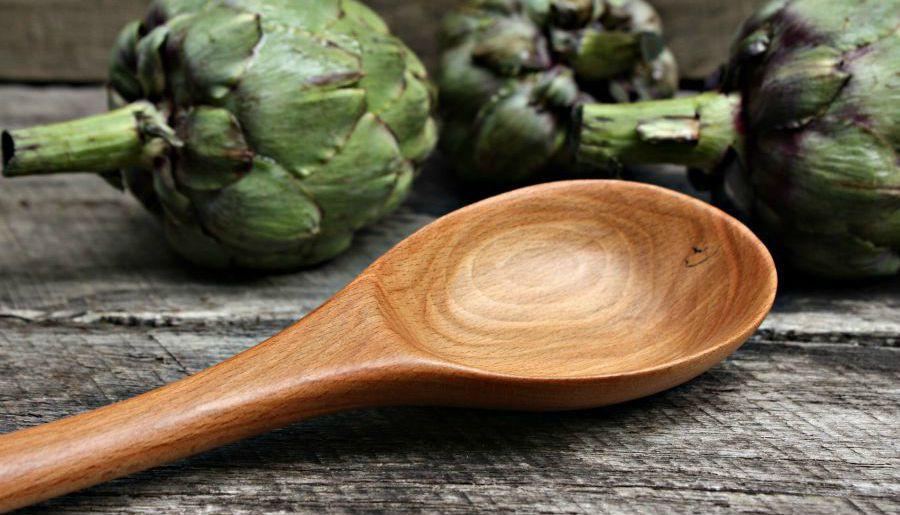







The Polder family started a small business in Florida making baked goods. Over time, customers preferred their baking utensils - ladles, spoons and spatulas - hand carved and chiseled from walnut, cherry, hickory, beech or maple - from trees near their 100 acre farm in Tennessee. Prices range all the way up to $599.
Much as their craftsmanship draws customers, so too does their ability to present their goods in a delightful way online. The four Polder daughters are the family brand at their Etsy store. And the craft of media has been honed as nearly as nicely as the wood goods themselves. Loran Polder, a frequent blogger for the clan, tells their story, and even advises on how to optimize the visual values of mobile phone photos using Pinterest and Instagram in a blog dedicated to marketing. Here's a bit of their story:
We love creating something by hand. You won't find any computer operated machinery in our shop, but rather a row of fine Swiss-made utensils and piles of little, irregular squares of worn out sandpaper. We believe in the old arts. We believe in true, personality inspired design. We believe in family owned and operated. We believe in made in the USA. And we believe that the result is something with an enduring elegance, quality and inspiration not found elsewhere.
Each beautiful piece of dreamware that we ship off was lovingly created amidst laughter and warm conversation in our workshop. We are so blessed to be able to work as a family at what we love, and we're grateful to you for giving us the opportunity.
 Our first wooden spoons were carved with a pocket knife. We still have them, and they are my favorites. Then, we bought Dad a horrible set of bench chisels with orange handles for Christmas. Despite the fact they were not the right tools for the job, he put them to use.
Our first wooden spoons were carved with a pocket knife. We still have them, and they are my favorites. Then, we bought Dad a horrible set of bench chisels with orange handles for Christmas. Despite the fact they were not the right tools for the job, he put them to use.
They were a bit of an upgrade from the pocket knife. In the mean time, people were noticing and buying our wooden spoons at the farmer's market and festivals we were going to! We were so elated. Caleb (18 at the time) was making wooden spoons along with Dad and everyone laughed to see that his spoons were decidedly the most popular and sold the quickest.
He had such a unique style. We were highly motivated to expand our line and we started taking pictures of our wares and thinking about a website. More of us started making spoons and it was a bit of a friendly competition to see who's creations sold the fastest. It was around this time that we named our business Polder's Old World Market and set out to develop a real brand, though we had no idea where to start. We also bought our first set of beautiful Swiss-made gouges and chisels.
That's really the main story of how Old World Kitchen by Polder's Old World Market got started. Though we originally intended to offer a wide range of crafts...hand forged items, leathercraft, candles and more...we have found a niche with the wooden kitchenware and that is our specialty. We may offer other types of artisan craftsmanship in the future.
Once we settled with focusing mainly on kitchenware, we added Old World Kitchen to our brand name, and even more recently, we've called our line dreamware because it's the kitchenware of your dreams. In 2011 we took a leap of faith and relocated from our tiny piece of property in Florida to a 100 acre farm in Tennessee. Polder Old World Market.


Bill wrote for WoodworkingNetwork.com, FDMC and Closets & Organized Storage magazines.
Bill's background includes more than 10 years in print manufacturing management, followed by more than 30 years in business reporting on industrial manufacturing in the forest products industries, including printing and packaging at American Printer (Features Editor) and Graphic Arts Monthly (Editor in Chief) magazines; and in secondary wood manufacturing for WoodworkingNetwork.com.
Bill was deeply involved with the launches of the Woodworking Network Leadership Forum, and the 40 Under 40 Awards programs. He currently reports on technology and business trends and develops conference programs.
In addition to his work as a journalist, Bill supports efforts to expand and improve educational opportunities in the manufacturing sectors, including 10 years on the Print & Graphics Scholarship Foundation; six years with the U.S. WoodLinks; and currently on the Woodwork Career Alliance Education Committee. He is also supports the Greater West Town Training Partnership Woodworking Program, which has trained more than 950 adults for industrial wood manufacturing careers.
Bill volunteers for Foinse Research Station, a biological field station staddling the border of Ireland and Northern Ireland, one of more than 200 members of the Organization of Biological Field Stations.






Have something to say? Share your thoughts with us in the comments below.